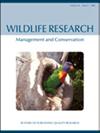减少道路上考拉的死亡:一项社会营销形成性研究
IF 1.6
3区 生物学
Q3 ECOLOGY
引用次数: 0
摘要
抽象的上下文。考拉是澳大利亚的象征,它们的数量正在严重下降。在一些地区,对考拉的主要威胁是车辆撞击。因此,了解什么可能会让人们更加警惕,并愿意在考拉数量众多的地区放慢速度,是一项重要的研究工作。目标本研究旨在利用野生动物价值导向(WVO)框架,一个基于价值的分割过程,来扩展保护视角。它将通过展示社会认知理论(SCT)的应用来研究野生动物信仰如何帮助确定有价值的群体,以野生动物保护干预为目标。这项研究的结果可以通过协助保护规划工作来降低驾驶速度,促进驾驶行为的积极变化,从而使考拉受益。方法。2019年采用方便抽样方式,通过截距调查收集数据。在澳大利亚昆士兰州的一个考拉优先保护区,共收集了661份回复。受访者被问及他们在考拉区开车时对野生动物的价值观、信仰、态度、规范、障碍和减速的意图。根据受访者的WVO确定了四个关键群体(即互惠主义者、多元主义者、传统主义者和疏远者),并进行了多群体结构方程建模以了解群体差异。关键的结果。该分析确定了几个重要的心理因素,这些因素会影响人们保护考拉的意图,这取决于受访者对野生动物价值的看法。禁令规范很重要,对传统主义者和多元主义者在考拉区开车时减速的意图产生了积极影响。个体态度正向影响多元主义者的安全驾驶意愿,而感知障碍负向影响互惠主义者的减速驾驶意愿。其他组没有显示出类似的结果。结论。一个人的WVO可以通过改变他们的驾驶行为来影响他们保护考拉的意图。不同的社会营销方法可以使针对不同WVO群体的保护策略受益,并为每个群体提供有针对性的信息和干预。的影响。本文论证了SCT在解释人们放慢速度保护考拉的意图方面的价值。对群体差异的识别表明,需要采取多种方法来改变考拉的行为,使其受益。本文章由计算机程序翻译,如有差异,请以英文原文为准。
Reducing koala roadkill: a social marketing formative study
ABSTRACT Context. Koalas are an Australian icon and their numbers are seriously declining. In some regions, a key threat to koalas is vehicle strikes. Therefore, understanding what might convince people to be more vigilant and willing to slow down in areas with high koala numbers is an important research undertaking. Aims. This study aims to use the wildlife value orientation (WVO) framework, a value-based segmentation process, to extend conservation insight. It will do this by demonstrating the application of social cognitive theory (SCT), to investigate how wildlife beliefs can help in identifying worthwhile groups to target with wildlife conservation interventions. The findings of this study can be used to benefit koalas by assisting conservation planning efforts to decrease driving speed and promote positive changes in driving behaviour. Methods. Data collection through intercept surveys was employed by convenience sampling in 2019. A total of 661 responses were collected from residents of a koala priority conservation area in Queensland, Australia. Respondents were asked about their wildlife values, beliefs, attitudes, norms, barriers, and intentions to slow down, while driving in a koala area. Four key groups were identified based on respondents’ WVO (i.e. mutualists, pluralists, traditionalists and distanced) and multigroup structural equation modelling was conducted to understand group differences. Key results. The analysis identified several significant psychographic factors that influenced people’s intentions to protect koalas dependent on what wildlife value respondents held. Injunctive norms were important, positively influencing the intention of traditionalists and pluralists to slow down while driving in a koala area. Individual attitude positively influenced safe driving intention for pluralists, while perceived barriers negatively influenced mutualists’ intention to slow down. Other groups did not show similar results. Conclusions. A person’s WVO can influence their intention to protect koalas by modifying their driving behaviour. Various social marketing approaches can benefit conservation strategies aimed at different WVO groups with targeted messages and interventions for each group. Implications. This paper demonstrates the value of SCT in explaining people’s intention to slow down to protect koalas. The identification of group differences demonstrates that varied approaches are required to deliver behavioural change to benefit koalas.
求助全文
通过发布文献求助,成功后即可免费获取论文全文。
去求助
来源期刊

Wildlife Research
生物-动物学
CiteScore
4.30
自引率
15.80%
发文量
56
审稿时长
3 months
期刊介绍:
Wildlife Research represents an international forum for the publication of research and debate on the ecology, management and conservation of wild animals in natural and modified habitats. The journal combines basic research in wildlife ecology with advances in science-based management practice. Subject areas include: applied ecology; conservation biology; ecosystem management; management of over-abundant, pest and invasive species; global change and wildlife management; diseases and their impacts on wildlife populations; human dimensions of management and conservation; assessing management outcomes; and the implications of wildlife research for policy development. Readers can expect a range of papers covering well-structured field studies, manipulative experiments, and analytical and modelling studies. All articles aim to improve the practice of wildlife management and contribute conceptual advances to our knowledge and understanding of wildlife ecology.
Wildlife Research is a vital resource for wildlife scientists, students and managers, applied ecologists, conservation biologists, environmental consultants and NGOs and government policy advisors.
Wildlife Research is published with the endorsement of the Commonwealth Scientific and Industrial Research Organisation (CSIRO) and the Australian Academy of Science.
 求助内容:
求助内容: 应助结果提醒方式:
应助结果提醒方式:


